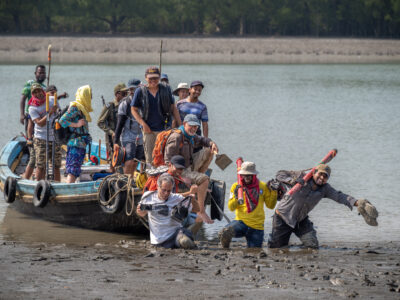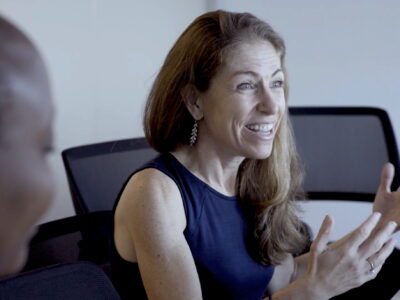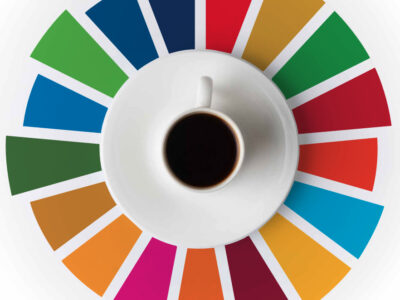NEW YORK, April 11 – The Prince Albert II of Monaco Foundation and the Principality of Monaco have launched a new partnership with the Earth Institute, Columbia University that stands to make important new strides in protecting biodiversity and addressing the urgent needs of the rural poor in Mali. With a $1.5 million grant, this investment in the Earth Institute’s work on agriculture techniques to increase crop yields and combat land degradation is aimed at helping farmers and their families secure a more stable livelihood while protecting the ecosystems where they live. In addition to this applied research, the grant also supports the scale-up of multi-sectoral development interventions in 166 of the most impoverished districts of the country, helping millions living in the Malian drylands of the Sahel.
“Mali is one of the poorest countries in the world and is gravely threatened by further environmental degradation and global climate change,” said Jeffrey Sachs, Director of the Earth Institute. “Drylands are fragile ecosystems. People living in these ecosystems are profoundly vulnerable, living at the edge of survival and facing increased climate instability and water stress. It is imperative that we find tangible and timely solutions to these challenges if Mali is to achieve the Millennium Development Goals and sustain its population in the longer term. Support from the Prince Albert II of Monaco Foundation and the Principality of Monaco has importantly boosted this vital search for solutions to Mali’s sustainable development.”
Today, over one million square miles of land have been affected by desertification in Africa, including much of the land in the Sahel. In the Millennium Villages of Tiby and Toya in Mali this grant will promote the development of sustainable agriculture while helping to preserve the fragile dryland ecosystem. Earth Institute agronomists and biodiversity experts will oversee agriculture investments in the development of customized fertilizers and soil conservation structures, improved crop seeds, integrated pest management, and other sound agronomic practices as well as shifting to high value products with demand in both domestic and international markets.
“Over the past 30 years, per capita food production has declined, leaving over a quarter of the population in Mali undernourished,” said H.S.H. Prince Albert II of Monaco. “As life sustaining natural resources are depleted and food production declines, serious effects on the health and stability of the country take hold. The Earth Institute will use a farmer-centric approach to participatory research and development to determine sustainable, financially viable agricultural and environmentally sound practices. Alleviating poverty and protecting the environment is one of the great global challenges of our time and we are proud to support these efforts towards lasting change in Mali.”
The Government of Mali, inspired by early successes of the Millennium Villages project in the communities of Tiby and Toya, requested Earth Institute assistance to provide the technical support needed for local governments to develop participatory planning tools focused on achieving the Millennium Development Goals (MDG). This grant makes this technical assistance possible, building the path for two million people in an additional 166 of the most food insecure districts in Mali to benefit from a proven package of techniques to revitalize the agriculture sector, secure basic social services such as health, education, water and sanitation, and improve roads and other infrastructure.
This scale-up of sustainable development work in the poorest districts of Mali combined with agriculture interventions will anchor income-generating resources to the region and help millions of people lift themselves out of poverty.
 About the Earth Institute, Columbia University
About the Earth Institute, Columbia University
The Earth Institute, Columbia University is the world’s leading academic center addressing the challenges of sustainable development. Our mission is to mobilize the sciences, education and public policy to achieve a sustainable Earth. The Earth Institute was established in 1996 and is home to more than 30 research centers and programs, including a network of over 800 faculty, researchers and their students spanning the fields of public health, environmental engineering, Earth science, social sciences and the biological sciences. Our flagship applied research and outreach program is the Millennium Villages project, proving that by fighting poverty through community-led initiatives, rural Africa can achieve the Millennium Development Goals —global targets for reducing extreme poverty and hunger by half and improving education, health, gender equality and environmental sustainability—by 2015. For more information, visit www.earth.columbia.edu.
 About The Prince Albert II of Monaco Foundation
About The Prince Albert II of Monaco Foundation
The Foundation has been created by H.S.H. the Sovereign Prince of Monaco in June 2006 and is dedicated to the protection of the environment and to promote a sustainable development on a global scale. The Foundation’s efforts focus on three main areas: Climate Change and renewable energies, Biodiversity, Water and desertification. The Foundation gives its support to projects in three main geographical zones: the Mediterranean basin, the Polar Regions, and the least developed countries. The Prince Albert II of Monaco Foundation supports initiatives of public and private organizations and companies, in the fields of research and studies, technological innovation and socially-aware practices. The Foundation is committed to raising the awareness of the population and States by implementing communication action plans capable of generating the maximum mobilization. In order to stimulate and develop innovation, the Foundation supports scientific and technical monitoring at an international level. For more information, visit www.fpa2.com.
 About the Principality of Monaco (Department of External Relations, Directorate for International Cooperation)
About the Principality of Monaco (Department of External Relations, Directorate for International Cooperation)
The fight against poverty is one of the Monegasque Cooperation’s priority intervention areas. The policy of cooperating to promote development can be divided into 4 categories of intervention: health and the social sector, education and training, support given to micro-economic activities, preservation and promotion of natural resources. More than 100 projects are scheduled for 2010 in 23 partner countries. For more information, visit
www.cooperation-monaco.gouv.mc





